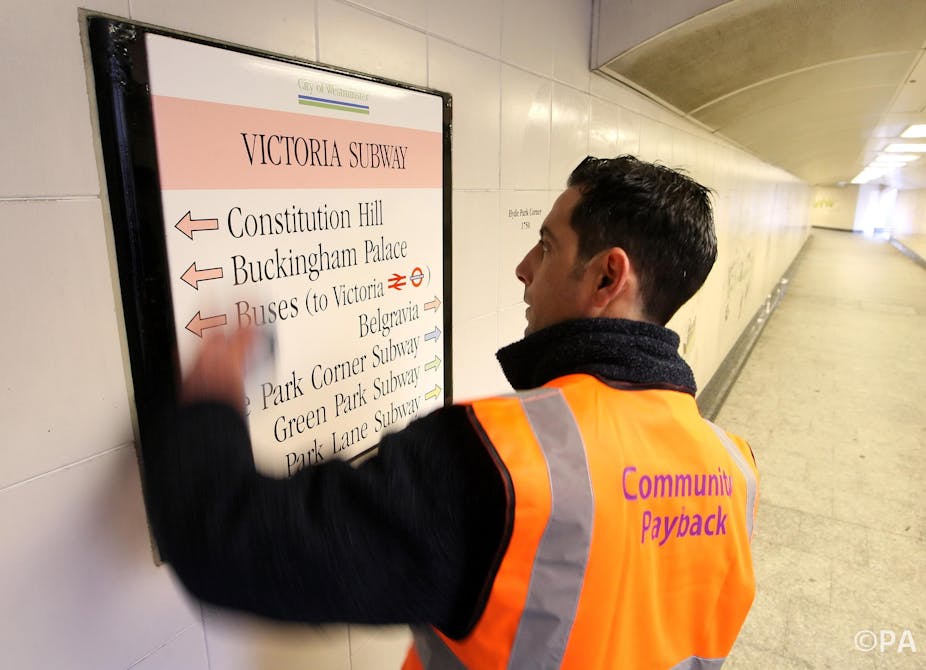A very significant moment in the history of the UK criminal justice system passed when the government forced through the first stage of its privatisation of probation services.
Since then there has been protest from probation officers at the frontline of providing services and there have been disturbing reports of chaos as the probation service prepares for what the Financial Times has called “the most ambitious privatisation project so far”.
The role of probation services has shifted in the century since the role of probation officer was set up by the Probation Act (1907) formalising what had previously been the work of voluntary organisations such as the Police Court Missionaries who were funded by church-based temperance societies. The role of the probation officer was defined by the act to “advise, assist and befriend” the offender. Modern probation officers were trained and qualified as social workers to work in the Criminal Justice System.
Harsh attitudes can be addictive
As I noted previously, one of the most significant cultural changes in the past 30 years has been the removal of a consensus around penal policy. As Jonathan Simon notes, progressive parties have found it difficult to challenge the basic assumptions of this new punitive approach: crime is rising and the proper response should be to expand the prison system.
The result in England and Wales has been a doubling of the prison population. In political terms, the only influential politician to raise doubts about our addiction to imprisonment has been Ken Clarke on his return to the Ministry of Justice in 2010.
The current secretary of state for justice, Chris Grayling, is committed to a prison-building programme and recent policies such as the “prisoner book ban” and “lights out at 10.30pm” for young offenders show that he is very keen to protect and enhance his reputation as a hard-liner on prisons and criminal justice.
Increased privatisation
In addition to the expansion of the use of imprisonment, the past 20 years have seen the increased privatisation of sections of the Criminal Justice System. Firms such as G4S have made huge profits from taking on roles that were previously seen as proper functions of the state. These have included running prisons and tagging offenders.
There is a clear philosophical objection that can be mounted against these developments. This is a core state function that should not be delegated to a private sector organisation whose aim is to make a profit. As the G4S and Serco tagging debacle shows, there are clear dangers to the public purse in this process of outsourcing.
Despite various warnings including a highly critical report by the Commons Public Accounts Committee, Grayling has pushed through the first stage in the part-privatisation of the Probation Service. The PAC report argued that the changes posed a risk to public safety because of their “scale, complexity and pace”. The Grayling Reforms see the creation of 21 Community Rehabilitation Companies. These CRCs will supervise 160,000 offenders who are deemed to be a medium to low-risk. The National Probation Service will retain responsibility for high-risk offenders.
The economics are fairly clear here: contracts for the supervision of low-risk offenders are much more attractive to companies as the costs will be lower. As the PAC report concludes, the timetable for the introduction of these complex changes has not allowed for the new arrangements to be fully piloted.
There is also the danger that firms such as G4S and Serco become “too big to fail”. There are a number of questions about the mechanisms for holding these organisations to account. The experience of similar reforms in other areas of welfare policy such as A4E and welfare to work hardly fill one with confidence.
The immediate impact of these changes on staff working in probation was highlighted by Joanna Hughes last week, just one month after the reforms came in. With the loss of people such as Hughes will be lost a great deal of valuable skill and experience.
Decline of rehabilitation
Under the legislation to set up privatisation of probation, the CRCs are not under obligation to employ qualified workers, so the result will almost inevitably be that less qualified and experienced (cheaper) staff will be employed to manage higher and higher caseloads.
Even those, who predicted that Grayling reforms would result in chaos did not envisage that it would develop so soon.
In his seminal work The Culture of Control, David Garland outlined what he sees as the huge cultural shift in attitudes to offenders. He argues that societal attitudes have become more punitive. He calls this process the “decline of the rehabilitative ideal”. The focus has shifted to the management and supervision.
Punishment has won out over welfare. Grayling’s privatised and fragmented probation is another example of this trend. The wording of the 1907 Probation Act has been replaced by the managerialist newspeak of risk assessment and commercial profit.

